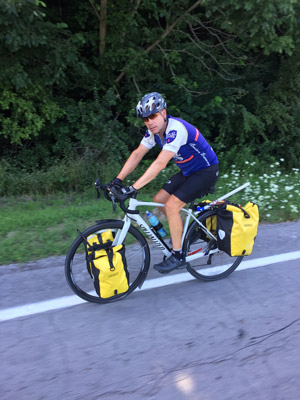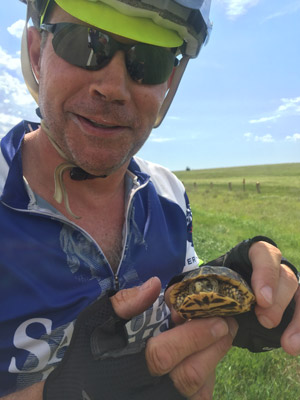There’s a saying, “Be the change you want to see in the world.” Mark Williams pedaled his way to that goal all summer.
The Questrom School of Business executive-in-residence and master lecturer in finance rode his Specialized Diverge bicycle into Yorktown, Va., on July 21, finishing a 3,700-plus-mile cross-country charity ride that began in San Francisco on June 4. Williams (Questrom’93) took on the ride to raise money for the Jamaica Plain–based group Bikes Not Bombs, which recycles bicycles and trains underemployed youths in bicycle repair. He raised more than $22,000.
Williams was accompanied by Mike Hill, an investment manager whose ride raised more than $28,000 for the Alzheimer’s Association. The two friends planned and trained for the trip for two years, expecting to average 80 miles per day while crossing nine states—California, Nevada, Utah, Colorado, Kansas, Missouri, Illinois, Kentucky, and Virginia—primarily on the old US Route 76 and US Route 50, which meant back roads and small towns. They rode through snowfall in the Nevada mountains to 120-degree heat in the Utah desert, not to mention a 10-mile-long plague of grasshoppers during a Kansas wheat harvest. “The event felt biblical,” Williams says.

Williams, on his Specialized Diverge bicycle, raised more than $22,000 with his cross-country bike ride for Bikes Not Bombs. Photo by Mike Hill
The cyclists tried to hit the road by 6 or 6:30 in the morning. One day they were riding from one hollow to another in Kentucky when a thunderstorm erupted and drenched them.
“I had sponges for feet and a sponge for a seat the rest of the day; it was just one of those miserable days,” Williams messaged that night.
On the plus side, he noted in an email a few days later: “Zero flats from California to Virginia. Knock on wood.”
Elijah Evans, executive director of Bikes Not Bombs, says the organization gets only about one rider a year who is willing to undertake such a marathon trek to spread the word about its mission of using the bicycle as a vehicle for social change.
The nonprofit “reclaims” thousands of donated bikes each year, using them to teach underemployed young people here to service bikes and giving them employment opportunities. It also repairs bikes in its own shops to provide jobs to local youth and raises funds, as well as sending thousands of unrepaired bikes overseas to seed bike-repair businesses and provide reliable transportation to people in Africa, the Caribbean, and Latin America. In one two-week period over this summer, the group shipped a container of 500 “raw” bicycles to a partner group in Ghana.
Williams says he first imagined a cross-country bike ride when, growing up in Delaware, he was captivated by a National Geographic article about a group cycling cross-country to celebrate the US Bicentennial. It was a neat idea, but he never thought he’d actually do it.

Williams and Hill. Photo by Williams
For the last decade, he has been riding the 18-mile round trip from his home in Newton to his office at BU. In 2009, he donated five new bicycles to a program in Uganda that gives them to rural schoolteachers. He has also donated several old bikes to Bikes Not Bombs, where he recently took a class on bike maintenance, and was impressed by the earn-a-bike portion of the nonprofit’s program.
“I just love the fact that these kids can have a little more direction and be given something they earned and feel a sense of responsibility, and all of a sudden they feel empowered,” he says. “I’m sure you can remember when you were a kid and you jumped on your first bike, the sense of empowerment that gave you. And these are kids who tend not to have that opportunity otherwise.”
The ride has changed the way Williams, known for his expertise in financial risk management, thinks about class and poverty in America. The route the two men chose took them through parts of the country that the railroad has abandoned and the highways have bypassed, small towns where Trump signs are common and poverty can be epidemic. There were places where the internet didn’t exist, the water was barely drinkable, and the food sold in grocery stores was poor quality, even in the breadbasket of America. “We saw broken-down cars and houses that look like no one lives there,” Williams says. “Then you see a light on—oh my gosh! It’s a broken system. These people have not been taken care of.”
And yet, he adds, “the level of kindness exhibited by perfect strangers has been overwhelming.” People along the way got out the hose when the two needed to cool off or took a lasagna out of the freezer when they stopped for the night, led them around a road closure or kept a restaurant open late so they could eat dinner. They had no problem staying in a hotel when one was available, but they also spent nights in homes, churches, and hostels.

A turtle rescue operation somewhere in Missouri. The Ornate Box Turtle was shuttled safely to the other side of the road. Photo by Mike Hill
“A lot of people really showed an interest in us and our health,” Williams says. “One of the first things they’d say was, ‘Be safe, it’s dangerous out there.’ Part of America is [dangerous], but we have this fabric where we just really care about each other, and then we have political campaigns that try to divide us. We found nice people throughout, very respectful, very helpful. And we have a better understanding of their challenges.
“Sitting on a bike for nine hours a day, you gain this mental awareness of everything around you,” he says. “And every once in a while, you have this stray dog that’s going to chase you and try to bite you, so you’ve got to stay on your toes.
“My hands are on the handlebars. My cell phone is not in my hands. That’s quite a luxury these days,” he says.
















































Related Stories
Climbing Mount Kilimanjaro for Charity
BU undergrads tackle legendary peak to benefit childhood cancer charity
Biking in Boston, Seriously
Comm Ave improvements promise a safer commute
BU Carpenter: From Gas Guzzler to Green Machine
Rooftop solar panels power Mike Wagner’s home and commute
Post Your Comment